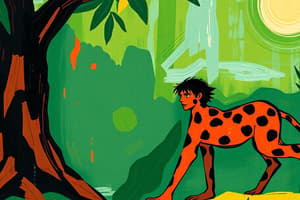Podcast
Questions and Answers
How did Mowgli's upbringing by wolves influence his behavior compared to human conduct?
How did Mowgli's upbringing by wolves influence his behavior compared to human conduct?
Mowgli's upbringing by wolves led to behavior that was not entirely compatible with human conduct, as his socialization occurred in a wild environment.
What role did Bagheera play in Mowgli's life regarding his safety in the jungle?
What role did Bagheera play in Mowgli's life regarding his safety in the jungle?
Bagheera, the cheetah, aimed to protect Mowgli from the tiger Sher Shah by deciding to send him to a village.
What is 're-socialization' in the context of Mowgli's journey?
What is 're-socialization' in the context of Mowgli's journey?
'Re-socialization' refers to Mowgli learning human behavior and adapting to societal norms after interacting with other humans.
Why was Mowgli initially reluctant to leave the jungle despite Bagheera's decision?
Why was Mowgli initially reluctant to leave the jungle despite Bagheera's decision?
In what way did Mowgli's peers influence his behavior after he encountered them?
In what way did Mowgli's peers influence his behavior after he encountered them?
What evidence from the story of Amala and Kamala supports the idea that behavior is learned rather than inherited?
What evidence from the story of Amala and Kamala supports the idea that behavior is learned rather than inherited?
Discuss the implications of the integration attempts made by missionaries on Kamala's development.
Discuss the implications of the integration attempts made by missionaries on Kamala's development.
Analyze the age-related differences in behavior between Amala and Kamala upon their rescue.
Analyze the age-related differences in behavior between Amala and Kamala upon their rescue.
What conclusion can be drawn about the necessity of primary socialization in humans, based on Kamala's experiences?
What conclusion can be drawn about the necessity of primary socialization in humans, based on Kamala's experiences?
Reflect on the significance of the story of Amala and Kamala in understanding the concept of socialization.
Reflect on the significance of the story of Amala and Kamala in understanding the concept of socialization.
Flashcards are hidden until you start studying
Study Notes
Mowgli and Socialization
- Mowgli, the main character, was lost in an Indian jungle after birth and raised by wolves.
- Rather than knowing his parents, Mowgli learned to adapt to jungle life with the wolf pack as his family.
- A tiger, named Sher Shah, posed a threat to Mowgli, prompting Bagheera the cheetah to suggest relocating him to a village.
- Resisting the idea of leaving, Mowgli eventually shifted his mindset after interacting with other humans.
- His socialization through wolves led to a unique behavior pattern, distinct from typical human conduct.
- "Re-socialization" highlights the necessity for Mowgli to adopt human behaviors to integrate into society.
Real-Life Socialization Cases
- Amala and Kamala, two girls rescued from wolves in 1920 India, exhibited wolf-like behavior, lacking basic social skills.
- At rescue, Amala was two years old and Kamala eight, yet both behaved like six-month-old children.
- Despite attempts at socialization, both girls struggled to adapt; Amala died shortly after, and Kamala learned little before her death.
- Their experiences underline that social norms and behaviors are learned rather than innate.
Lifelong Socialization Process
- Socialization is crucial for integrating individuals into society, teaching values, customs, and behaviors.
- Key mediums of socialization include family, peers, teachers, schools, and various forms of media.
- Social connections help shape thoughts and emotions, allowing children to develop within peer groups.
Impact of Media on Socialization
- Media influences contemporary socialization, evolving from newspapers and radio to modern platforms like Facebook and YouTube.
- While media can positively shape values and behaviors, it may also contribute negatively to individual attitudes.
Concepts of Social Control
- Social control refers to mechanisms that regulate individual behaviors in accordance with societal norms and expectations.
- Informal social control involves family and community reactions to noncompliance with social norms, often employing ridicule or mockery.
- Formal social control is enforced by institutions like police and courts, addressing behaviors classified as criminal.
Informal vs. Formal Social Control
- Informal social control is prevalent in tightly-knit communities, where members discuss deviations to correct behavior.
- Formal social control intervenes when informal measures fail, imposing legal penalties for criminal acts to maintain societal order.
Social Change Dynamics
- Society perpetually evolves, transitioning from communal systems, based on deep relationships, to modern associational societies, prioritizing individualism.
- Social change can stem from cultural shifts, demographic changes, and emerging ideas, which can positively or negatively impact the social fabric.
Social Changes in Bangladesh
- Bangladesh has witnessed shifts from joint families to nuclear families, with increased participation of women in decision-making and the workforce.
- Economic transformations have led to reduced agricultural contributions to GDP and growth in industrial sectors.
- Changes in international interaction influence societal norms, values, and daily practices.
Social Movements and Their Impact
- Social movements arise from public dissatisfaction with social injustices, historically leading to pivotal societal changes.
- Martin Luther King Jr. spearheaded the civil rights movement, denouncing racial discrimination and advocating for equality through peaceful protests.
- His famous “I Have a Dream” speech emphasized the need for unity and equality, influencing key legislations such as the Civil Rights Act and the Voting Rights Act.
Legacy of Martin Luther King Jr.
- King's approach was inspired by Mahatma Gandhi's non-violent resistance philosophy.
- His assassination in 1968 marked a tragic end to a significant figure in the struggle for civil rights, yet his legacy continues to inspire movements for social justice and equality.
Studying That Suits You
Use AI to generate personalized quizzes and flashcards to suit your learning preferences.




